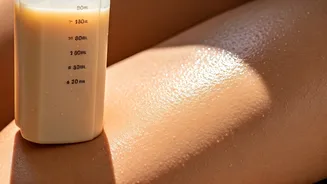Acne and Blemishes
One of the common skin-related consequences of consuming protein shakes is the emergence of acne. This is primarily triggered by the hormonal shifts initiated
by these supplements. Many protein powders, particularly those derived from whey and casein, can lead to a surge in insulin-like growth factor 1 (IGF-1). High levels of IGF-1 can amplify the production of sebum, an oily substance secreted by the skin. Excessive sebum can clog pores, setting the stage for acne and blemishes. Furthermore, some protein powders contain added sugars or dairy components that can exacerbate acne. For those prone to breakouts, this may contribute to more frequent or severe skin issues. It's essential to recognize how protein shakes interact with the body's hormonal balance and their impact on skin health.
Dehydration Concerns
Protein consumption in excess, which can happen if you're heavily relying on protein shakes, could cause dehydration. When the body breaks down protein, it produces nitrogenous waste that must be processed and expelled by the kidneys. This process requires water, which can potentially lead to water loss and leave the skin dry and dull. Skin that's dehydrated tends to look less radiant, with fine lines and wrinkles becoming more noticeable. Increased water intake is crucial to offset the dehydrating effects of high protein consumption. Also, it’s advisable to be mindful of overall fluid balance to ensure that the skin remains hydrated and healthy. Choosing a protein shake that's low in added ingredients and focusing on other ways of hydration becomes essential.
Inflammation Effects
Protein powders may contain additives and hidden sugars that contribute to inflammation within the body. These components can cause or worsen skin conditions like eczema or rosacea. Artificial sweeteners, used in some protein powders to enhance taste, can disrupt the gut microbiome, which, in turn, can contribute to systemic inflammation that is visible on the skin. High levels of inflammation can accelerate skin aging and lead to pigmentation problems. It's imperative to read the labels carefully. Look for protein powders with minimal ingredients and no added sugars. Incorporating anti-inflammatory foods into your diet and avoiding highly processed options can also help to mitigate inflammation and protect your skin.
Hormonal Imbalance Risks
Protein shakes, particularly those with whey protein, can cause hormonal acne, especially for those sensitive to dairy. Whey protein can spike insulin levels, which, in turn, can stimulate the production of sebum. This can lead to acne and other skin issues. For individuals susceptible to hormonal imbalances, carefully considering the type of protein shake and its ingredients is essential. Opting for plant-based protein alternatives, such as pea or soy protein, might be beneficial. Consulting with a dermatologist or nutritionist to determine the most appropriate protein source is advisable, to prevent skin issues. Understanding the potential for hormonal imbalance from protein shakes can inform dietary choices.
Gut Disruption Impact
The ingredients in protein powders, particularly artificial sweeteners, can disrupt the balance of the gut microbiome, potentially leading to increased inflammation. This can affect skin health, with conditions such as eczema, psoriasis, and acne potentially flaring up or worsening. A healthy gut is crucial for overall wellness, including maintaining clear, healthy skin. Consider incorporating probiotics into your routine to help balance your gut flora. Limiting processed foods and sugars while consuming fiber-rich foods supports a healthy gut environment. By supporting gut health, you're improving your skin's health.













